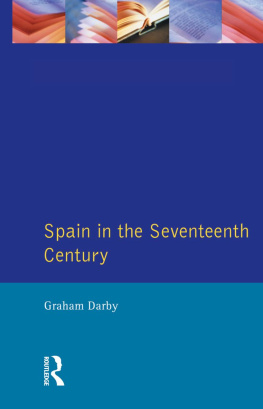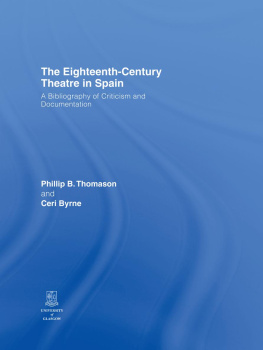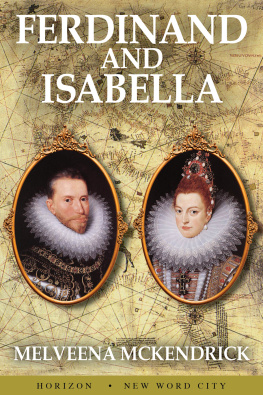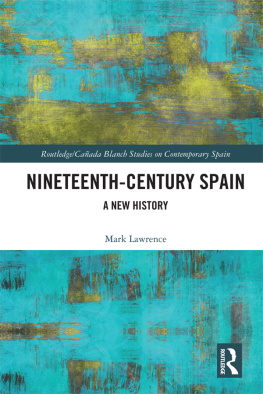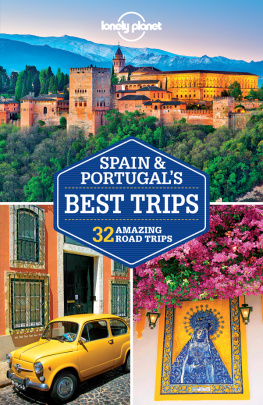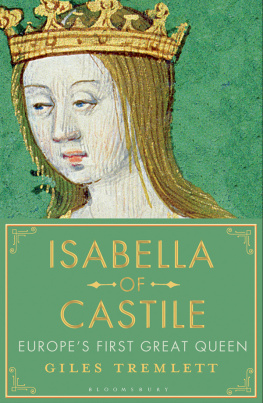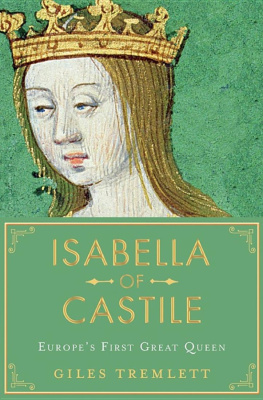Spain, 14741598
QUESTIONS AND ANALYSIS IN HISTORY
Edited by Stephen J. Lee, Sean Lang and Jocelyn Hunt
Other titles in this series:
Imperial Germany, 18711918
Stephen J. Lee
The Weimar Republic
Stephen J. Lee
Hitler and Nazi Germany
Stephen J. Lee
The French Revolution
Jocelyn Hunt
The Spanish Civl War
Andrew Forrest
The English Wars and Republic, 16371660
Graham E. Seel
The Renaissance
Jocelyn Hunt
Tudor Government
T. A. Morris
The Cold War
Bradley Lightbody
Stalin and the Soviet Union
Stephen J. Lee
Parliamentary Reform, 17851928
Sean Lang
British Foreign and Imperial Policy, 18651919
Graham Goodlad
The First World War
Ian Cawood and David McKinnon-Bell
Spain, 14741598
JOCELYN HUNT
First published 2001
by Routledge
2 Park Square, Milton Park, Abingdon, Oxon OX14 4RN
Simultaneously published in the USA and Canada
by Routledge
711 Third Avenue, New York, NY 10017
Routledge is an imprint of the Taylor & Francis Group, an informa business
2001 Jocelyn Hunt
Typeset in Akzidenz Grotesque and Perpetua by
Keystroke, Jacaranda Lodge, Wolverhampton
All rights reserved. No part of this book may be reprinted or reproduced or utilised in any form or by any electronic, mechanical, or other means, now known or hereafter invented, including photocopying and recording, or in any information storage or retrieval system, without permission in writing from the publishers.
British Library Cataloguing in Publication Data
A catalogue record for this book is available from the British Library
Library of Congress Cataloging in Publication Data
Hunt, Jocelyn.
Spain, 14741598 / Jocelyn Hunt.
p. cm. (Questions and analysis in history)
Includes bibliographical references and index.
1. SpainHistoryFerdinand and Isabella, 14791516. 2. SpainHistoryCharles I, 15161556. 3. SpainHistoryPhilip II, 15561598.
I. Title. II. Series.
DP162 .H86 2000
ISBN 9780415222662
CONTENTS
SERIES PREFACE
Most history textbooks now aim to provide the student with interpretation, and many also cover the historiography of a topic. Some include a selection of sources.
So far, however, there have been few attempts to combine all the skills needed by the history student. Interpretation is usually found within an overall narrative framework and it is often difficult to separate the two for essay purposes. Where sources are included, there is rarely any guidance as to how to answer the questions on them.
The Questions and Analysis series is therefore based on the belief that another approach should be added to those which already exist. It has two main aims.
The first is to separate narrative from interpretation so that the latter is no longer diluted by the former. Most chapters start with a background narrative section containing essential information. This material is then used in a section focusing on analysis through a specific question. The main purpose of this is to help to tighten up essay technique.
The second aim is to provide a comprehensive range of sources for each of the issues covered. The questions are of the type which appear on examination papers, and some have worked answers to demonstrate the techniques required.
The chapters may be approached in different ways. The background narratives can be read first to provide an overall perspective, followed by the analyses and then the sources. The alternative method is to work through all the components of each chapter before going on to the next.
ACKNOWLEDGEMENTS
The author and the publishers wish to thank the copyright holders for their permission to reproduce the following material:
Don Quixote by Miguel de Cervantes, translated by J. M. Cohen (Penguin Classics, 1950) copyright J. M. Cohen, 1950. Reproduced by permission of Penguin Books Ltd.
The Tribute Money by Titian, reproduced with permission of the National Gallery, London.
Every effort has been made to obtain permission to reproduce copyright material. If any proper acknowledgement has not been made, we would invite copyright holders to inform us of the oversight.
Simplified family tree of the ruling families in Spain, 14741598
Note: Underlined names indicate more than one appearance
Map 1 Kingdoms and Provinces of the Iberian Peninsula, 1474
SPAIN AT THE TIME OF ITS UNIFICATION
BACKGROUND NARRATIVE
As the twenty-first century gets under way, Spain is one of the European countries which has firmly adopted a political system based on regional self-government. This is a reminder that, until the late fifteenth and the early sixteenth century, Spain was not a single country. By the end of the sixteenth century, all the kingdoms of the Iberian peninsula had been brought together. During the sixteenth century, the King of Spain governed more of Europe than any ruler since the Romans; and at the same time, Spain became the dominant power in the New World. This book traces the history of Spain during these remarkable years, and this first chapter provides a summary of the condition of the kingdoms of Ferdinand and Isabella on the eve of their accessions.
The kingdoms of the Peninsula, in the third quarter of the fifteenth century, were Castile, Aragon, Navarre and Granada, which were to become what we now know as Spain. Castile and Aragon were brought together by the marriage of Ferdinand and Isabella in 1469 and their subsequent policies. Granada and Navarre were taken by conquest. The kingdom of Portugal remained an independent country. Although it was united with Spain in 1580, through inheritance, it was to regain its independence within sixty years. Few contemporaries predicted that the marriage of Ferdinand and Isabella would result in the permanent unification of Aragon and Castile. Through the fifteenth century it had often appeared more likely that Castile would join with Portugal. The Portuguese Avis dynasty had taken the throne during a war to resist Castilian control, but frequent marriages linked the two houses ever closer. In the event, however, it was to be Castile and Aragon which together formed the kingdom of Spain. Meanwhile, the ties binding the three provinces of Aragon were never strong and the fifteenth century saw a serious attempt by Catalonia to establish itself as an independent state. Thus both Castile and Aragon experienced civil war in the years before the marriage of Ferdinand and Isabella.
The kingdoms of Spain had been established during the long years of the reconquista. In the early part of the eighth century, Muslim armies swept across the narrow straits of Gibraltar and defeated the Visigothic rulers of Iberia. Although raiding parties then crossed the Pyrenees, France was never Moorish, and indeed the northern parts of the peninsula, such as Asturias, were never absorbed into Muslim Spain; it was here that the reconquest began. The rest of Iberia, however, proved much harder to reconquer. Not until the tenth century was the area known as Old Castile reconquered. The first of the Iberian kingdoms to achieve its modern boundaries was Portugal, which completed its


